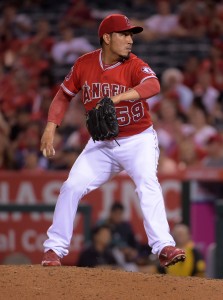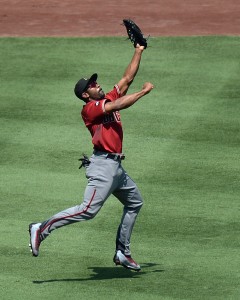The Dodgers approached the division-rival Diamondbacks about a potential Zack Greinke trade after Greinke cleared revocable trade waivers earlier this month, reports Ken Rosenthal of FOX Sports. Rosenthal’s report is the first mention of the fact that Greinke cleared waivers, although the fact that he did so is in no way surprising. Greinke’s six-year, $206.5MM contract comes with a staggering $34.4MM annual salary, and he’s owed $172.5MM from 2017-21. Talented as he may be, the vast majority of teams wouldn’t consider doling out that type of money for any pitcher, let alone one whose contract runs through his age-37 season.
Talks between the Dodgers and D-backs, according to Rosenthal, didn’t progress very far, and a trade isn’t likely to be revisited this season, as Greinke would no longer be eligible for a new team’s postseason roster now that it is officially Sept. 1 on the east coast. However, Rosenthal suggests that the two sides could revisit talks this winter, adding that the Diamondbacks may become increasingly willing to shed some payroll after a disappointing season that is currently on pace to yield the worst average attendance in franchise history.
Of course, there are plenty of variables that will factor into whether the D-backs are able to line up on a Greinke deal with the Dodgers or with any other club. First and foremost, it’ll depend on who is calling the shots atop Arizona’s baseball operations department. Chief baseball officer Tony La Russa and GM Dave Stewart signed Greinke to his record-setting deal (with owner Ken Kendrick’s approval), but the job security of both of men has been called into question recently due to the D-backs’ wildly disappointing season. A new GM or president of baseball operations could potentially be more inclined to deal Greinke than the incumbent duo.
Beyond that, Greinke’s performance in the 2016 season hasn’t lined up with the dominant results in Los Angeles that elevated his stock to the point that enabled him to demand such a staggering price. While Greinke turned in a pristine 2.30 ERA with 8.3 K/9 and 1.9 BB/9 in 602 2/3 innings over the life of his three-year Dodgers career, he’s pitched to a 4.17 earned run average and missed more than a month due to an oblique injury in his inaugural season with the D-backs. He’s seen incremental decreases in his strikeout and ground-ball rates, while his walk rate has elevated a bit. ERA estimators feel that he’s been better than that 4.17 mark would indicate, but it’d be unwise to ever expect Greinke to replicate his astounding 2015 campaign (1.66 ERA in 222 2/3 innings). Even if a team were to believe that Greinke’s true talent was that of a pitcher who can sustain an ERA in the 2.50 to 3.00 range — and there presumably are such teams — the D-backs would probably still have to include significant financial assistance in order to bring Greinke’s salary down to a more palatable price point.
On top of that, Greinke has a 15-team no-trade clause, giving him some considerable power over a theoretical effort to trade him. While he might welcome a chance to return to the Dodgers or a different contending club, there’s no guarantee that’d be the case. The odds of the D-backs finding an interested trading partner to which Greinke would not or could not block a deal that had the financial means to absorb the majority of an enormous contract and still believed him capable of pitching like a top-tier starter are long. That’s only half of the equation. If the D-backs were to get serious about trading Greinke and could find a willing partner, they’d still have to try to pry prospect value away from the interested team. And, the greater the ask from Arizona, the more of Greinke’s contract a trading partner would ask the D-backs to cover. Finding that balance point would be extremely difficult.
Rosenthal writes that the Dodgers will probably circle back to these talks down the line, and that certainly seems plausible, especially if there is a regime change in the Arizona front office. But, the number of hurdles that stand between the idea of this trade and the actual fruition of the trade is probably too great to realistically expect a deal to ever materialize.


